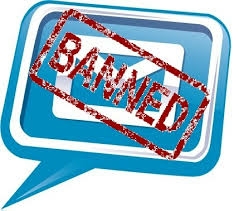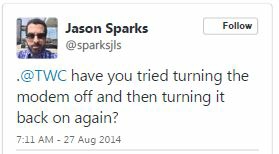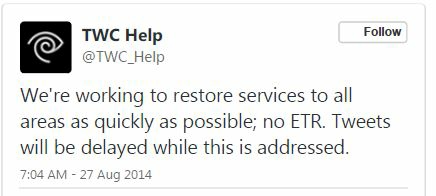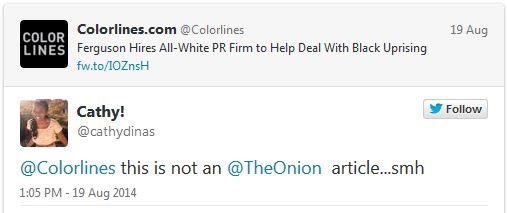Tesco CEO's First Email to Employees
 Most of us want less email, but the new CEO of Tesco, a British chain of supermarkets, wants to hear from employees directly. In his first email to the staff of more than 500,000, Lewis acknowledges issues. It's a smart move because the results are poor and obvious. Sales are down 4% through mid-August, and the stock fell 32% in the past year.
Most of us want less email, but the new CEO of Tesco, a British chain of supermarkets, wants to hear from employees directly. In his first email to the staff of more than 500,000, Lewis acknowledges issues. It's a smart move because the results are poor and obvious. Sales are down 4% through mid-August, and the stock fell 32% in the past year.
Lewis gives his background for credibility and promises to listen to customers and employees. He asks for employees' opinions: "I want to hear your thoughts and ideas. I want to hear what you think we could do differently or better." For "immediacy," he encourages employees to email him personally.
Here's Lewis' message to employees:
Dear colleagues,
Today is my first day at Tesco, and so I wanted to write to you all to tell you a bit about me, and my initial plans as I start work as your new Chief Executive.
The most important thing I want to tell you is that I couldn't be more excited to be joining Tesco. It's an honour and a privilege to be asked to lead such a world-class and important business.
As you may know, I worked for Unilever for 27 years and so I got to know Tesco well from the perspective of being one of its largest suppliers. I've always had an enormous admiration for Tesco, its people and its expertise.
I've met and worked with many Tesco people over the years, and so I know the hard work and dedication which is a hallmark of this business. I'm proud to be leading a team of half a million talented and committed people around the world. In our DNA we have always been the customers' champion, and we will be again.
You will know only too well that it has not been an easy time for our business. The retail market in all the countries where we operate has become extremely tough, and is changing faster than ever. We are losing market share in our largest market and we need to address this with urgency.
The most important thing is that we all focus on being on top of our game. We need to keep it simple and customer focused. I know periods of change can be unsettling, but we have to take our destiny in our own hands and be absolutely focused on delivering the best possible experience for our customers. She or he will reward us if we constantly put them first.
I am looking forward to getting around the business and doing a lot of listening. In my first few days I will be talking to colleagues at Welwyn and Cheshunt directly, and visiting as many of our businesses and stores as possible – listening to our customers and meeting as many of you as I can. I will also be meeting some of our shareholders and investment analysts.
I will be taking some time to get to know the business better, to understand the challenges and opportunities we face. I'll be looking at all parts of the business. Clearly we all want to see an improvement in performance, but I won't take any hasty decisions. The decisions I take will be based on what's best for customers, for shareholders, for colleagues, and hence the whole Tesco business. We have some urgent issues to deal with, but we must address these in a way which is consistent with building a long-term sustainable future.
I will always communicate openly and transparently with you and I'd like to encourage the same from you in return. I want to hear your thoughts and ideas. I want to hear what you think we could do differently or better. Hopefully we will get a chance to do this in person, but for the sake of immediacy please send any comments or ideas to me by email.
I want to pay tribute to Philip [Clarke]. Over a 40-year career in Tesco he has been a key figure in making Tesco the business it is today, and in his time as Chief Executive he has steered the business through the toughest conditions the sector has ever experienced. I would like to also thank him personally for the very professional way he has managed, and continues to manage, the transition.
These are challenging times, but we will emerge stronger. With a relentless focus on our customers and a preparedness to challenge ourselves and take bold decisions we can retain our position as the customers' champion. This is a great business made up of great people, with real expertise and I am confident that together we can succeed.
I know I can count on your support, and I'm looking forward to working with you.
Dave
Discussion Starters:
- This message was posted on Yammer, part of Tesco's intranet that is intended for employees only. What are the ethics of an employee releasing this message?
- What works well in Lewis' message, and what could be improved? If you were an employee at Tesco, how do you think you would react? What if you were an investor?
- How should Lewis respond to emails from employees? What if they become unmanageable, for example, 500 each day?
The Vest Is Back: Walmart's New Dress Code
Employees aren't too happy about Walmart's new dress code. On its website, the company gives employees options for collared navy blue or white shirts, and khaki or black pants, capris, shirts, or skorts.
In several blog posts on Walmart's intranet, HR executive Barbara Simone, explained the dress code, including the Return of the Vest:
Walmart also produced a video for employees, which has become unavailable to the public.
Employees can post comments on the intranet, and several were leaked to Gawker:
"With all due respect to the company, this is more of a financial burden to our family since this is our only source of income with my wife and two kids. We can hardly afford to live on my income now with us having to pay for a new uniform (aside from the vest). It's silly. The uniform we have now works. Why change it?"
"Working conditions at my store are atrocious. There is little coverage in any dept. to provide anything close to decent customer service. ... For ten years I gave my all but my efforts and voice are ignored. My complaints as well as other associates' seem to not matter one bit. Our registers and other equipment are slow and unreliable. I do not see how bringing back the vests as if we were living in 1994 will change anything. There are real problems to solve in our stores."
Discussion Starters:
- What's your view of the new policy? Why would Walmart implement this now?
- Imagine that you're Barbara Simone. How would you respond to these employee comments on the intranet?
Zara Apologizes for Concentration Camp Shirt
Retailer Zara has pulled a shirt that many said looked like Holocaust attire. Promoted as a "striped 'sheriff' t-shirt," the product reminded people of the Star of David and stripes (although they were vertical) worn by Jewish prisoners in concentration camps.
The company apologized in a tweet: "We honestly apologize, it was inspired by the sheriff's stars from the Classic Western films and is no longer in our stores."
Inditex, Zara's parent company, also posted a news article to provide background and apologize:
Zara Kids has removed a children's t-shirt from its stores and website. The t-shirt withdrawn was inspired by the classic American Westerns and has been taken out of circulation due to the potential similarity with the Star of David that has been used as a yellow star patch. Zara has issued a heartfelt apology on its social network profiles.
The garment was available only for just a few hours and sales of the t-shirt have been marginal. The items will be reliably destroyed.
Inditex would like to reiterate its utmost respect for all cultures and religions. The Group is a Company where people from 180 nationalities work together representing all the cultures, races and religions of the modern world. Inditex is proud of its cultural diversity. In addition, respect and dignity feature among the principles which guide and define its corporate values. The Group condemns and rejects any form of discrimination.
This isn't the first time Zara used Nazi-reminiscent images. In 2007, Zara pulled a handbag with swastikas, which the company says were made in Asia, where the image has a different cultural significance.
Discussion Starters:
- Do you believe that the shirt was an innocent mistake? Why or why not?
- Assess the parent company's message. How well does it rebuild the brand image?
- Does this news affect your decision to shop at Zara?
NFL Commissioner Changes Domestic Violence Policy
 After criticism, NFL Commissioner Roger Goodell issued a 2000-word statement to change the league's domestic violence policy. Accused of assaulting his finance, Baltimore Ravens running back Ray Rice was suspended for two games.
After criticism, NFL Commissioner Roger Goodell issued a 2000-word statement to change the league's domestic violence policy. Accused of assaulting his finance, Baltimore Ravens running back Ray Rice was suspended for two games.
Backlash was fierce, with groups criticizing the punishment as too lenient-less than suspensions for some involvement with drugs.
Goodell admitted his mistake and changed the policy to six games after one incident of assault, battery, sexual assault, or domestic violence involving force. He included all employees in the policy. The New York Times describes the message sent to NFL owners as "a letter and accompanying memo" and called the change "stunning in its earnestness and clarity."
Here is excerpt from the entire message:
"At times, however, and despite our best efforts, we fall short of our goals. We clearly did so in response to a recent incident of domestic violence. We allowed our standards to fall below where they should be and lost an important opportunity to emphasize our strong stance on a critical issue and the effective programs we have in place. My disciplinary decision led the public to question our sincerity, our commitment, and whether we understood the toll that domestic violence inflicts on so many families. I take responsibility both for the decision and for ensuring that our actions in the future properly reflect our values. I didn't get it right. Simply put, we have to do better. And we will."
Discussion Starters:
- Describe Goodell's choice for a letter and memo. What were his other choices for conveying the message, and why did he choose these methods?
- Assess Goodell's letter and memo. What works well, and what could be improved? Consider the intended audiences and communication objectives.
Time Warner's Response to the Outage
Time Warner Cable had a major service outage on Wednesday morning, but the response was slow and questionable. As people throughout the country took to Twitter to report loss of Internet service, the company was quiet, and calls went unanswered.
Customers joked about how to solve the problem:
After about an hour of reported complaints, TWC tweeted about the outage:
Another hour later, TWC issued this statement:
"At 4:30 a.m. ET today, during routine network maintenance, an issue with our Internet backbone created disruption with our Internet and On Demand serices. At of 6 a.m. ET services were largely restored, as updates continue to bring all affected customers back online."
Although TWC claims the outage was caused by an Internet backbone problem, some suspect the company's system was hacked. Reports say that the outage seems more like a DDoS attack (distributed denial of service).
Discussion Starters:
- Assess TWC's response. Is it fair to say that the response was slow? Someone did tweet at 7 a.m., and maybe employees were busy working on fixing the problem?
- Analyze TWC's statement. If the outage was caused by a DDoS attack, why won't the company admit it, as so many others have?
Professor Bans Email
 Spring-Serenity Duvall, assistant professor of communications at Salem University, got tired of responding to students' emails:
Spring-Serenity Duvall, assistant professor of communications at Salem University, got tired of responding to students' emails:
"For years, student emails have been an assault on professors, sometimes with inappropriate informality, sometimes just simply not understanding that professors should not have to respond immediately. In a fit of self-preservation, I decided: no more. This is where I make my stand!"
With her department head's approval, Duvall banned all emails from students unless they are writing to schedule a meeting with her. In her course syllabus, she explains her rationale:
"E-mail: You should only use email as a tool to set up a one-on-one meeting with me if office hours conflict with your schedule. Use the subject line "'Meeting request.' Your message should include at least two times when you would like to meet and a brief (one-two sentence) description of the reason for the meeting. Emails sent for any other reason will not be considered or acknowledged. I strongly encourage you to ask questions about the syllabus and assignments during class time. For more in-depth discussions (such as guidance on assignments) please plan to meet in person or call my office. Our conversations should take place in person or over the phone rather than via email, thus allowing us to get to know each other better and fostering a more collegial learning atmosphere."
According to Duvall, the ban has been successful: She spends less time responding to minor emails and more time talking with students on the phone or in her office. She has made one exception to the policy and allows students to email course-related content.
Discussion Starters:
- What's your view of Duvall's new policy? How would you react as a student?
- The top comment on the story was, "95% of the emails you receive as a professor can be answered by ‘read the syllabus.'" Do you agree with this statement?
Assessing 2014 Emmy Speeches
Entertainment Weekly ranked the 23 acceptance speeches from the 2014 Emmy Awards. Breaking Bad's Bryan Cranston (Lead Actor in a Drama Series) topped the list:
"It was Cranston's night. He had the perfect amount of humility ('Even I thought about voting for Matthew'), humor ('I love you, especially those scenes in bed,' he told Anna Gunn) and inspiration ('find your passion, Sneaky Petes')."
Entertainment Weekly also complimented Aaron Paul, who won for best supporting actor in Breaking Bad:
"Using his Emmy acceptance speech to express his love for Cranston and praise his wife was nice. But really, he gets this high up for having the best exit, jogging backward and pumping his trophy into the air."
Other speeches were deemed too short, too long, cute, safe, uneventful, memorable, etc.
Discussion Starters:
- Which was your favorite speech? Why?
- Watch the last couple on Entertainment Weekly's list. Is the criticism justified?
Best Buy Executives Explain Quarterly Results
 Although sales continue to decline, Best Buy executives are sticking with the plan to turn the business around primarily through cost-cutting. The company has been successful in reducing expenses, but sales continue to lag.
Although sales continue to decline, Best Buy executives are sticking with the plan to turn the business around primarily through cost-cutting. The company has been successful in reducing expenses, but sales continue to lag.
In Best Buy's second quarter results report, CEO and President Hubert Joly said,
"Like other retailers and as reflected in this quarter's performance, we continued to see a shift in consumer behavior: consumers are increasingly researching and buying online. As a result, traffic to our brick and mortar stores continued to decline, yet our in-store conversion and online traffic continued to increase due to the execution of our Renew Blue strategy which is in direct alignment with this shift. Our Renew Blue strategy is designed to (1) grow our online business; (2) enhance our in-store customer experience; and (3) leverage our multi-channel capabilities; all to deliver to our customers great advice, service and convenience at competitive prices in the channel they want to be served.
"During the quarter, we continued to make progress against this strategy, including (1) increasing our Net Promoter Score across channels by 400 basis points year-over-year; (2) improving our in-store experience by rolling out over 800 new Samsung and Sony home theater, 18 Pacific Kitchen and Home and 7 Magnolia Design Center stores-within-a-store; and (3) leveraging our new ship-from-store and digital marketing capabilities to drive a 22% increase in Domestic comparable online sales."
CFO Sharon McCollam reinforced Joly's message: "Industrywide sales are continuing to decline in many of the consumer electronics categories in which we compete."
Discussion Starters:
- Read Best Buy's entire second-quarter report. What are the key messages?
- What's your reaction to the executives' statements? Overly positive, blame-shifting, realistic, optimistic, or something else?
Ferguson PR Firm Speaks Out
The situation in Ferguson, MO, following the police shooting of Michael Brown is so tenuous that the city hired a PR firm to help. As you might expect in any emotionally charged situation, the firm has been criticized. Most of the focus has been on Common Grounds Public Relations as an all-white firm.
CEO Denise Benetele defended her firm's role, calling diversity an "industry-wide challenge" and explaining the involvement of The Devin James Group, a minority-owned firm.
Ferguson clearly needs help. In the middle of a dispute that's getting international attention, Mayor James Knowles said, "There's not a racial divide in the city of Ferguson. That is the perspective of all residents in our city. Absolutely."
|
|
||||
| Aug. 20, 2014 | ||||
| PR Firm Aiding Ferguson Responds to Industry Critics | ||||
| By Denise Bentele | ||||
|
Just as an EMT would respond to a 911 call, Common Ground PR was asked to provide immediate, emergency help in the form of fielding the overwhelming number of media inquiries the city was receiving until it assembled a long-term team to handle this crisis. Our short-term agreement to assist had nothing to do with the preceding tragic events. Rather, as we watched the news of ongoing turmoil, it was apparent that the negative images could forever impact our region's economic development efforts and the lives of our neighbors. And so we went to field calls from media around the world, trying to connect them to the appropriate sources while city leadership tended to an incredibly challenging, unfolding situation. The pace of queries was profound – like catching raindrops in a hurricane. It's not every day that a city of 21,000 residents gets more than 500 media calls in a day. It's not every day that the alphabet soup of news networks and stations ALL converge in one of the more than 90 municipalities in St. Louis County. But when all of the cameras are gone, we as St. Louisans will be left to rebuild. We will deal with companies who leave town and others who decide not to invest in St. Louis. I was dismayed at the negative reaction online and on social media, especially among fellow communications professionals, who pointed at the lack of diversity on our staff as a sign of the "greater problem." Increasing the diversity of communications professionals is an industry-wide challenge that we all need to tackle. But as a local St. Louisan who watched this tragedy unfold, I offered our assistance because it was clear that this community was overwhelmed and needed immediate help fielding media inquiries. The color of our skin reflected nothing of our concern to help our broader community respond to the watchful world. In my first conversation with Ferguson city officials, I advised that any solution to strife and development of long-term reconciliation would have to come with the assistance of a member of the black community skilled at community engagement with these key constituents. To that end, The Devin James Group, a nationally certified Minority-owned firm, has been working with St. Louis County and the City of Ferguson as an independent liaison to handle the public relations and long-term needs, work with community leaders and seek regional support in a grassroots effort to build true engagement. With the long-term coalition and communications help of CEO Devin James, local residents and businesses can focus on determining what's best for this community. Devin is currently identifying and recruiting communities and leaders to participate and assessing potential for collaborative capacity which could result in the forming of or partnering of community coalitions, creating an outreach plan for improving awareness as well as developing a platform that gives the local community an outlet to address the issues and media perceptions. We thank the many people who have shared their support and advice and we hope this helps answer questions our peers have, and hope more importantly that you send your prayers to the long-term healing of St. Louis. Denise Bentele, APR President & CEO, Common Ground Public Relations |
Discussion Starters:
- What advice would you give Mayor James Knowles?
- Did Ferguson do the right thing in hiring Common Ground?
- Assess Denise Bentele's statement. What works well, and what could be improved?
SeaWorld Tries New Approach
After denying impact on park attendance, SeaWorld is finally admitting that negative publicity about its killer whales is affecting business:
"The company believes attendance in the quarter was impacted by demand pressures related to recent media attention surrounding proposed legislation in the state of California."
The media attention began with the film Blackfish, which criticized how SeaWorld treated its orcas. Musical performers had cancelled their scheduled shows, and attendance had dropped, but revenue held steady for a while, partly because the park increased prices. Now, shares are down 30% for the year (almost 50% for the past 12 months).
After ignoring the negative publicity, SeaWorld's approach was to contradict Blackfish and other animal rights activists. Then, SeaWorld seemed to take a more proactive approach, highlighting on its Facebook page and Twitter account animals it was saving and protecting.
Now, the company has taken a new approach, spending hundreds of millions of dollars to enlarge tanks and provide exercise treadmills. SeaWorld is also committing $10 million to match funds for killer whale research.
With the headline, "Announcing BIG NEWS on the exciting future of killer whales at SeaWorld parks," an email was sent to SeaWorld customers (entire message):
Discussion Starters:
- Read SeaWorld's email to customers. Assess the design, message strategy, and organization. What works well, and what could be improved?
- What do you think about SeaWorld's viability going forward? Will the parks spring back, or are they doomed?
Read a case study about SeaWorld's Response to Blackfish. If you would like an assignment (a recommendation report) about the case, send me email (https://www.hotelschool.cornell.edu/app/facultydb/instructors/an97).
United Airlines' Apology Form Letter
Form letters are a great way for companies to ensure consistency and save time, but they have to be customized. United Airlines forgot this important step.
A spokesperson for the airline said, "I cannot confirm if it is authentic based on the picture, but it appears to be an unfinished customer response letter. If I knew who the customer was we would reach out to the customer and apologize for the response." The letter was posted on Reddit.
A week before this letter was written, the Wall Street Journal ran an article about airline apologies. According to the article, Southwest employs 200 people just to handle complaints, and Delta employs 150 to answer complaint and compliment letters. Delta no longer uses form letters.
United told the WSJ reporter, "Generally we tell the customer we are sorry they did not have the experience they expected on United. We try to be empathetic to the customer but not sound insincere." The article confirms that United has some work to do:
"United Airlines, which had the highest rate of complaints filed at the DOT among major airlines the past three years, has a team of about 450 customer-care agents handling general issues and refunds. Add to that 400 people handing frequent-flier program issues and about 100 answering baggage-related letters and emails."
United apologies dating back to 1996 were form letters. Here's a comparison on Untied.com.
Discussion Starters:
- In addition to the obvious missing information, the letter has some other problems. What are they?
- The WSJ article mentions a 2009 study showing that an apology may be more valued by customers than compensation. What works best for you? Think about a time when service didn't meet your expectations, and you told the company. How did it respond, and what was your reaction?
Real Estate Company Apologizes for Inappropriate Email
Real estate website ListedBy.com sent an email to alert its customers that Robin Williams died. Several people thought the announcement was inappropriate and told the firm so.
The situation reminds me of small business advisor who used Amy Winehouse's death to promote her services. Although ListedBy.com was a bit more subtle, the email still feels like an opportunity to connect with prospective customers. Using a death for this purpose just seems wrong.
To its credit, the company sent a nice apology:
Members,
I wanted to run in to the office even at this late hour and make sure we issue a prompt apology. Earlier tonight we sent out our wkly newsletter including the news of Robin Williams death. We used our same newsletter template we always use for sending out breaking news and while it was potentially a vocal minority we did receive a couple dozen emails that felt it was simply not tasteful and not our place to send out an email like this.
In hindsight we completely agree and understand why this was not a good idea to send and we want to issue our most sincere apology to all our members and anyone who was in any way offended by this.
It was simply an issue of us ourselves as human beings receiving the news about half an hour before we were trying to select the "news of the day" to send out to our members, and being that we were sincerely extreme Robin Williams fans it seemed like there was no news we could think of that was more important than this. In hindsight again though we realize we actually could have negatively represented the man we intended to honor and for that we are very sorry. It again was a very fast paced decision from someone that really was shocked by the news and we hope you as members forgive us if this was in bad taste. As an extra part of our apology and to try to accomplish our initial goal of honoring a great person who was such a big part of American culture for so long we will be making a donation this week to his charitable foundation. Thanks again for your understanding our human flaw on this send and from now on we'll just stick to real estate when it comes to reporting the news!
Sincerely,
The ListedBy.com Team
Discussion Starters:
- Assess the apology: What works well, and what could be improved?
- Edit the apology: Help the CEO (or whoever wrote it) punctuate properly.
Again, Starbucks Denies Giving Support to Israel
Starbucks just updated a statement on its website denying giving support to Israel. This isn't the first time the company is responding to similar claims.
Starbucks' Jim Olson told CNN Money that the decision to close Israeli stores in 2003 "was not related to political issues" but was for "operational challenges." This month, Olson said that the statement, written in 2010, was updated because of an "uptick in false rumors out there about Starbucks and the Middle East."
Some of the rumors were about the possibility of Starbucks investing in SodaStream. The Palestinian BDS National Committee (BNC) threatened boycotts if this were true because SodaStream is manufactured in, according to the group, an illegal Israeli settlement in the West Bank.
Facts about Starbucks in the Middle East
Facts about Starbucks in the Middle East (UPDATED August 2014)
Though our roots are in the United States, we are a global company with stores in 65 countries, including nearly 600 stores in 12 Middle Eastern and North African countries employing more than 10,000 partners (employees). In countries where we do business, we are proud to be a part of the fabric of the local community – working directly with local business partners who operate our stores, employing thousands of local citizens, serving millions of customers and positively impacting many others through our support of local neighborhoods and cities.
Our 300,000 partners around the globe have diverse views about a wide range of topics. Regardless of that spectrum of beliefs, Starbucks has been and remains a non-political organization. We do not support any political or religious cause. Additionally, neither Starbucks nor the company's chairman, president and ceo Howard Schultz provide financial support to the Israeli government and/or the Israeli Army in any way.
What we do believe in, and remain focused on, is staying true to our company's long-standing heritage – simply connecting with our partners and customers over a cup of high quality coffee and offering the best experience possible to them – regardless of geographical location.
Questions and Answers:
Is it true that Starbucks or Howard Schultz provides financial support to Israel?
No. This is absolutely untrue. Rumors that Starbucks or Howard provides financial support to the Israeli government and/or the Israeli Army are unequivocally false. Starbucks is a publicly held company and as such, is required to disclose any corporate giving each year through a proxy statement.
Has Starbucks ever sent any of its profits to the Israeli government and/or Israeli army?
No. This is absolutely untrue.
Is it true that Starbucks closed its stores in Israel for political reasons?
No. We do not make business decisions based on political issues. We decided to dissolve our partnership in Israel in 2003 due to the on-going operational challenges that we experienced in that market. After many months of discussion with our partner we came to this amicable decision. While this was a difficult decision for both companies, we believe it remains the right decision for our businesses.
Do you have plans to re-open should the opportunity arise?
We decided to dissolve our partnership in Israel in 2003 due to the on-going operational challenges that we experienced in that market.
When and where the business case makes sense and we see a fit for the Starbucks brand in a market we will work closely with a local partner to assess the feasibility of offering our brand to that community. We will therefore continue to assess all opportunities on this basis. At present, we will continue to grow our business in the Middle East as we have been very gratified by the strong reception of the brand in the region. We continue to work closely with our business partner, the Alshaya Group, in developing our plans for the region.
Do you work with a Middle East partner to operate Starbucks stores?
Through a licensing agreement with trading partner and licensee MH Alshaya WLL, a private Kuwait family business, Starbucks has operated in the Middle East since 1999. Today Alshaya Group, recognized as one of the leading and most influential retailing franchisees in the region, operates nearly 600 Starbucks stores in the Middle East and Levant region. In addition to its Starbucks stores, the Alshaya Group operates more than 2,600 retail stores in the Middle East, Russia and North Africa, providing jobs for more than 40,000 employees of more than 110 nationalities.
We are extremely fortunate and proud to have forged a successful partnership for the past fifteen years and look forward to building on this success.
In which Middle Eastern and North African countries do you operate?
We partner with Alshaya Group to operate Starbucks stores in Bahrain, Cyprus, Egypt, Jordan, Kuwait, Lebanon, Morocco, Oman, Qatar, Saudi Arabia, Turkey and United Arab Emirates in the Middle East and North Africa region. We are fortunate to have the opportunity to work with so many communities, and we are committed to providing the Starbucks Experience while respecting the local customs and cultures of each country we are a part of. We are also committed to hiring locally, providing jobs to thousands of local citizens in the countries where we operate.
This updates a statement originally posted to the Starbucks Newsroom in 2010.
Discussion Starters:
- Do you believe that Starbucks invests in Israel? If not, why would these rumors get started?
- Assess Starbucks' statement: the messaging, organization, tone, and so one. What works well, and what could be improved?
- What are the most and least convincing claims in the statement?
How (Not) to Avoid Reporters' Questions
Technical glitch or avoiding the question? Pundits are debating whether former Israeli Ambassador to the United States Michael Oren really couldn't hear Andrea Mitchell's question.
Mitchell (MSNBC): "And I just have to ask you very briefly, in ten seconds, were you aware any of eavesdropping on John Kerry by Israeli intelligence?"
Oren: "Andrea, I cannot hear you. I'm sorry." [ear piece touch] "[utterances] I'm in Tel Aviv. I cannot hear you. I'm sorry."
Oren was still the Israeli ambassador at the time of the alleged eavesdropping.
Huffington Post compiled a video of embarrassing question evasions. And this reminds me of the woman who hid under her desk to avoid a reporter. Not the best option.
Discussion Starters:
- Do you believe that Oren couldn't hear? Explain your response with evidence from the video.
- If Oren was simply evading the question, what would have been a better strategy for managing the question?
Graphical Student Loan Calculator
Embracing the value of interactive graphics, The New York Times created an online calculator for student loans. The results may be depressing, but the calculator tells students how much they will owe and what they need to earn to cover the expense. By filling in a few fields, students can see how interest rates, loan term (years), and additional monthly payments affect their principal and interest.
Using $29,400 as the average loan for a student graduating in 2012, we see that students need to earn that amount per year. Of course, more is better. At $35,923 per year, the loan repayment amount would equal about 20% of a student's discretionary income. (Of course, that may vary tremendously.)
Seeing the data graphically may help students get a clearer picture about what to expect-for better or worse.
Discussion Starters:
- Do you find the calculator easy to use? Is it useful?
- What other ways can you visual the data? Consider more creative graphics than this bar chart.
- What's your view of the recommended 20% of discretionary income for student loan repayments? In what ways could it vary based on geographical, health, personal, and other factors? Would this be a realistic number for you?
Hotel Fines Guests for Negative Reviews
So much for embracing feedback. The Union Street Guest House in Hudson, NY, implemented a policy of fining wedding bookers $500 for negative reviews.
The Guest House seems to miss the point about social media, and the policy itself is silly: couples are responsible for each negative review posted by their guests. Imagine a wedding gone bad, which could, theoretically, inspire hundreds of guests to post to TripAdvisor or Yelp. There goes the new house fund.
The policy was as follows:
"If you have booked the Inn for a wedding or other type of event anywhere in the region and given us a deposit of any kind for guests to stay at USGH there will be a $500 fine that will be deducted from your deposit for every negative review of USGH placed on any internet site by anyone in your party and/or attending your wedding or event. If you stay here to attend a wedding anywhere in the area and leave us a negative review on any internet site you agree to a $500. fine for each negative review."
A scan of the Guest House's Yelp reviews indicates a service issue, with an average of 2 stars out of 5.
The owners haven't handled these reviews very well, on one occasion replying, "I know you guys wanted to hang out and get drunk for 2 days and that is fine. I was really really sorry that you showed up in the summer when it was 105 degrees . . . I was so so so sorry that our ice maker and fridge were not working and not accessible."
The Guest House fares better on TripAdvisor (4 out of 5), but the reviews are still spotty.
After some backlash about the policy, the owners posted on Facebook (since removed) that the policy was a "tongue-in-cheek response to a wedding many years ago." This is almost as good as Amy's Baking Company claiming that its Facebook page was hacked and was being investigated by the FBI.
Discussion Starters:
- What advice would you give the owners of the Guest House about managing social media and, specifically, about responding to negative online reviews? (See Chapter 7 for tips.)
- Practice responding to reviews on behalf of the owner. Choose two or three on Yelp and draft responses.
Airbnb Sells Sustainability
 In its latest advertising campaign, Airbnb is pushing its role in sustainability. Taking lessons from Chapters 5 and 7 in the textbook, Airbnb boasts saving the planet in concrete terms.
In its latest advertising campaign, Airbnb is pushing its role in sustainability. Taking lessons from Chapters 5 and 7 in the textbook, Airbnb boasts saving the planet in concrete terms.
According to a recent report, published with the Cleantech Group, "In one year alone, Airbnb guests in North America saved the equivalent of 270 Olympic-sized pools of water while avoiding the greenhouse gas emissions equivalent to 33,000 cars on North American roads." The company also says that North American Airbnb guests use 63% less energy than do hotel guests, while European guests use 78% less.
The report results are summarized in an infographic on Airbnb's blog.
Discussion Starters:
- Read Airbnb's report summary. Which statistics make sense to you, and which are perhaps overstated or irrelevant?
- What do you think of Airbnb's marketing approach? Do you find it effective? Why or why not?
- Asses the company's infographic. What principles from Chapter 9 are followed effectively?
SeaWorld and Southwest End 26-Year Partnership
In a joint statement, SeaWorld and Southwest Airlines announced the end of a promotional partnership started in 1988. The companies aren't answering questions beyond the scant (and dare I say, loose) explanation in the release:
Joint Statement on Southwest and SeaWorld Partnership
Southwest and SeaWorld have mutually decided not to renew their partnership when the contract expires at the end of the year. Our promotional marketing relationship began in 1988 and was one of the first of its kind – focused on co-marketing opportunities between Southwest passengers and SeaWorld visitors.
The companies decided not to renew the contract based on shifting priorities. Southwest is spreading its wings with new international service, and increased focus on local market efforts. With an increasing international visitor base, SeaWorld is looking to focus on new and growing markets in Latin America and Asia, among others.
The companies will continue to work together through Southwest Vacations. Southwest's three specialty airplanes will return to the company's traditional livery.
Southwest and SeaWorld have enjoyed their long relationship, and wish each other continued success.
The more obvious reason, which The Wall Street Journal, Los Angeles Times, and others point to, is backlash from "Blackfish." The movie questioned SeaWorld's treatment of killer whales at theme parks and blamed several trainers' deaths on how the animals are held in captivity.
In the statement, the companies mention "shifting priorities." Although both have an increasingly international focus, Southwest is looking towards more local marketing. Huh?
Discussion Starters:
- Another option for the companies is to announce the decision without giving a reason at all. What do you think of this strategy?
- The companies aren't giving statements beyond this joint message. Is that a wise decision? Why or why not?
Malaysia Airlines Representative Speaks Out
 Hugh Dunleavy, commercial director of Malaysia Airlines, wrote an editorial in The Telegraph to defend the airline's flight path for MH17 and ponder the future of the company. Twice this year, Malaysia Airlines flights have crashed. MH17 was struck down over Ukraine, and earlier this year, MH370 was lost between Kuala Lumpur and Beijing.
Hugh Dunleavy, commercial director of Malaysia Airlines, wrote an editorial in The Telegraph to defend the airline's flight path for MH17 and ponder the future of the company. Twice this year, Malaysia Airlines flights have crashed. MH17 was struck down over Ukraine, and earlier this year, MH370 was lost between Kuala Lumpur and Beijing.
Now, the airline is in jeopardy. Cancellations are up to 20 % in some regions, and the company seems to be running out of cash.
In his editorial, Dunleavy says that was happened to MH17 could have happened to any airline and defers responsibility for flight paths away from the industry:
"For too long, airlines have been shouldering the responsibility for making decisions about what constitutes a safe flight path, over areas in political turmoil around the world.
"We are not intelligence agencies, but airlines, charged with carrying passengers in comfort between destinations.
"Against the backdrop of areas with increasingly volatile political situations, such as Ukraine and Gaza, we as an industry must act now to create a system of approval that guarantees safe air passage for all commercial airlines."
Dunleavy admits that the Malaysian government, which owns a majority stake in the company, was already in "a process of assessing the future shape of our business" before the more recent MH17 loss. PR Daily wonders whether a name change and repositioning of the brand would help save the airline.
Discussion Starters:
- If you had a scheduled flight on Malaysia Airlines, would you cancel it? Discuss your rationale.
- What do you think would help the struggling airline at this point?
- When PR Daily proposes a name change and a "radical brand overhaul," what do you think they mean? What would this look like? What other companies have done something similar?
A Tribute to Kathy Berggren
My friend and colleague Kathy Berggren died suddenly last week, a terrible shock to the Ithaca community. Kathy taught courses in the communication department at Cornell for more than 20 years and recently moved to a management communication position at the Dyson School.
Although Kathy served in this role for only one semester, she already made her mark. She built the program from scratch, creating a practical course to develop students' personal and professional communication skills. From this semester and from her many in the communication department, it's hard to say how many students would call her "mentor."
Perhaps Kathy's greatest contribution was her work with teaching assistants. She mastered the large lecture, which many business and management communication faculty resist, by developing a cadre of students who could teach and coach other students. Her comprehensive guide for teaching assistants should help sustain the course now that she's gone.
One of the many modules Kathy taught exceptionally well was an "elevator pitch." I'm guessing that thousands of students can sell themselves within minutes because of Kathy's guidance.
As a frequent Facebook poster, Kathy might enjoy the outpouring of comments on her page. Friends and family are posting memories and photos for everyone to enjoy. I found out about her death from a mutual friend who texted me about some Facebook posts. And so goes our communication world today.
As a colleague, I'll miss Kathy's forwarded articles, including recommendations for BizCom in the News. I know she found this blog useful as a teaching tool, and I'm glad for that.
As a friend, I'll miss Kathy's direct communication. She set me straight on more than one personal issue I was whining about. I told her that I have many friends who will empathize with me but too few who will tell me what to do when it's clear what must be done.
I regret never seeing Kathy work with students directly. I imagine they benefited from her delicate balance of caring for people regardless of their ability and telling them what they needed to hear. I know I did.


























